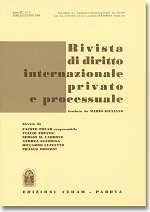ERA-Conference on Cross-border Mediation, ADR & ODR
On April 25 and 26, 2013 the Academy of European Law (ERA) will host a conference on cross-border mediation, ADR & ODR. The conference will cover various aspects of cross-border alternative dispute resolution including the latest trends and developments in legislation at national, international and EU level. Further information is available here. The programme reads as follows:
Thursday, 25 April 2013
- 08:45 Arrival and registration
- 09:10 Welcome
Angelika Fuchs
Moderator: Ana Gonçalves
I. CURRENT SITUATION OF MEDIATION IN A COMPARATIVE PERSPECTIVE
- 09:15 State of play following the implementation of the Mediation Directive: concepts and practice of mediation
Jeremy Lack - 09:45 Discussion
- 10:00 Integration of mediation in dispute resolution procedures, including the effects of mediation on limitation and prescription periods
Carlos Esplugues - 10:30 Discussion
- 10:45 Coffee break
- 11:15 Learning from the experience of others: what incentives for mediation are given?
- The Netherlands, England and Wales: Naomi Creutzfeldt-Banda
- France and Belgium: Vincent Tilman
- Poland and Czech Republic: Rafal Morek
- Italy and Spain: Carlos Esplugues
- Portugal: Ana Gonçalves
- 13:00 Lunch
Moderator: Jeremy Lack
II. INNOVATIVE PROCESSES FOR CONSUMER
AND E-COMMERCE DISPUTE RESOLUTION
- 14:15 Consumer ADR & ODR: recent experiences in the member states
Naomi Creutzfeldt-Banda - 15:00 Discussion
- 15:15 Coffee break
- 15:45 Opportunities and challenges for ODR: how will consumers and traders benefit from the new EU legislation?
- 16:15 ODR and consumer protection: high standards or low costs? Taking a fresh look at the EU and UNCITRAL initiatives
Hans Schulte-Nölke - 16:45 Discussion
- 17:15 Towards an instrument on B2B ADR?
Vincent Tilman - 17:45 Discussion
- 18:00 End of the first conference day
- 19:00 Evening programme and dinner
Friday, 26 April 2013
Moderator: Diana Wallis
III. MEDIATORS AND MEDIATION PROCEDURE
- 09:00 How to ensure the quality of mediation? Code of conduct and professional law for mediators
Manon Schonewille (live via videolink) - 09:30 Discussion
- 09:45 Skills of (e-) mediators
Ana Gonçalves - 10:15 Discussion
- 10:30 Coffee break
- 11:00 Results of mediation and enforcement of mediation agreements
Elena D’Alessandro - 11:30 Discussion
- 11:45 Confidentiality in mediation
- Functions of confidentiality
- What information is subject to confidentiality?
- Which persons are bound to respect it?
- Disclosure of information in subsequent litigation or enforcement proceedings
Rafal Morek - 12:15 Discussion
- 12:45 Self-regulation or regulatory approach: how to further encourage parties to the mediation table?
Diana Wallis - 13:15 Lunch and end of the conference
 The fourth issue of 2012 of the
The fourth issue of 2012 of the